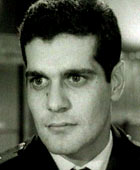Omar Sharif
He continued to play romantic leads, in films like Funny Girl (1968) and The Tamarind Seed (1974), and historical figures like the eponymous characters in Genghis Khan (1965), The Mamelukes (1965) and Che!
His acting career continued well into old age, with a well-received turn as a Muslim Turkish immigrant in the French film Monsieur Ibrahim (2003).
[21] He adopted the surname Sharif, meaning "noble" or "nobleman" in Arabic, after he was picked by Egyptian director Youssef Chahine to star in his film The Blazing Sun.
[26] His mother, Claire Saada, was a noted society hostess, in whose house Egypt's King Farouk was a regular visitor prior to his deposition in 1952.
[27] In his youth, Sharif studied at Victoria College, Alexandria, where he showed a talent for languages, He befriended fellow actor Ahmed Ramzy and Youssef Chahine in school.
Sharif achieved success through other movies like Struggle on the Nile (1959), A Rumor of Love (1960), and There Is a Man in Our House (1961), which made him a huge competitor to Salah Zulfikar, Shoukry Sarhan and Rushdy Abaza, the Egyptian cinema giants at the time.
Sharif was given the role when Dilip Kumar turned it down, Horst Buchholz proved unavailable and Maurice Ronet could not use the contact lenses necessary to hide his eyes.
[34] Casting Sharif in what is now considered one of the "most demanding supporting roles in Hollywood history" was both complex and risky as he was virtually unknown at the time outside Egypt.
However, as historian Steven Charles Caton notes, Lean insisted on using ethnic actors when possible to make the film authentic.
[36] As Sharif noted, his accent enabled him to "play the role of a foreigner without anyone knowing exactly where I came from", which he stated proved highly successful throughout his career.
[38][39] Sharif went on to star in another Hollywood film, Anthony Mann's The Fall of the Roman Empire (1964) where he played the support role of Sohaemus of Armenia.
Sharif was third-billed in Columbia's Behold a Pale Horse (1964), playing a priest in the Spanish Civil War alongside Gregory Peck and Anthony Quinn.
'"[40] Film historian Richard Schickel wrote that Sharif gave a "truly wonderful performance", especially noteworthy because of his totally different role in Lawrence of Arabia: "It is hard to believe that the priest and the sheik are played by the same man".
[43] Sharif was a fan of the novel and lobbied for one of the supporting roles, but Lean decided instead to cast him in the lead as Yuri Zhivago, a poet and physician.
His decision to work alongside Streisand angered Egypt's government because she was a vocal supporter of the State of Israel,[48] and the country condemned the film.
Sharif co-starred with Catherine Deneuve in Mayerling (1968), and the following year was reunited with Gregory Peck in the western, Mackenna's Gold (1969), an unsuccessful attempt to repeat the success of The Guns of Navarone (1961).
[37] The Burglars (1971), a French crime film with Jean-Paul Belmondo and Dyan Cannon was a huge hit in France but little seen in the English speaking world.
He appeared in a romantic thriller alongside Julie Andrews for Blake Edwards, The Tamarind Seed (1974); it did well at the box office and the critics gave good reviews.
Heavenly Dog (1981) and a Ryan O'Neal thriller Green Ice (1981) (which was made in the 1970s), and a small role in the comedy Top Secret!
[56] Sharif worked steadily in television, appearing in Pleasure Palace (1981), Peter the Great (1986), and Anastasia: The Mystery of Anna (1986) (as Nicholas II of Russia).
Sharif could also be seen in Memories of Midnight (1991), Beyond Justice (1992), Catherine the Great (as Alexei Razumovsky), Gulliver's Travels (1996), Heaven Before I Die (1997), and Mysteries of Egypt (1998).
The documentary was written and directed by Lebanese-Australian director Daizy Gedeon, who approached Sharif for the project because she wanted someone 'remarkable' to help her tell the true story of Lebanon: a country which, at the time, was still shrouded in the fog of its Civil War.
[57] In the film, Sharif shares personal stories of his upbringing, and recites the poetry of famous Lebanese poet Khalil Gibran.
[62] Sharif's final role was as lead actor in the short science education film 1001 Inventions and the World of Ibn Al-Haytham, which was directed by Ahmed Salim and was released as part of the United Nations' International Year of Light campaign, operated by UNESCO.
[66] Touring through Europe, the Circus attracted thousands of spectators who watched the matches via Bridge-O-Rama, a new technology (and predecessor to the modern-day VuGraph) that displayed bidding and cardplay on television monitors.
In 1970, Sharif and the circus went to London's famous Piccadilly Hotel for an 80-rubber match against British experts Jeremy Flint and Jonathan Cansino.
It was a major crossroad in Sharif's life and changed him from an established family man to a committed bachelor living in European hotels.
Actor and friend Tom Courtenay revealed in an interview for the 19 July 2008 edition of BBC Radio's Test Match Special that Sharif supported Hull City Association Football Club and in the 1970s he would telephone their automated scoreline from his home in Paris for score updates.
[95] His son Tarek Sharif (who portrayed his father's character as a child in Doctor Zhivago) said that his father was becoming confused when remembering some of the biggest films of his career; he would mix up the names of his best-known films, Doctor Zhivago and Lawrence of Arabia, often forgetting where they were filmed.On 10 July 2015, less than six months after his former wife's death at the same age, Sharif died after suffering a heart attack at a hospital in Cairo.
[97] At the 35th Academy Awards, Sharif was nominated for Best Supporting Actor for his role as Sherif Ali in Lawrence of Arabia but lost to Ed Begley.











